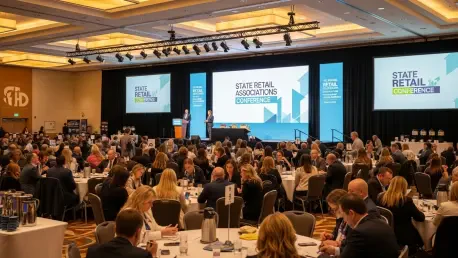In a bustling conference hall in Chicago, hundreds of retail leaders from across the nation gathered this year to face a pressing reality: the retail industry stands at a crossroads, shaped by rapid advancements in artificial intelligence (AI) and the unpredictable tides of trade policies. Hosted by the National Retail Federation (NRF), the 2025 Council of State Retail Associations (CSRA) conference emerged as a vital arena for state and national retail advocates to unite. This event underscored a critical need for collaboration to navigate transformative technologies and economic pressures, setting the stage for impactful discussions that could redefine the sector’s trajectory.
The significance of this gathering cannot be overstated. With AI reshaping everything from customer interactions to supply chain logistics, and trade tariffs threatening pricing stability, the stakes for retailers have never been higher. The conference promised not just dialogue but actionable strategies, drawing attendees eager to share insights and forge alliances. This pivotal moment in Chicago offered a glimpse into how the industry plans to adapt and thrive amid complex challenges.
A Historic Gathering of Retail Minds in Chicago
The CSRA conference, held in the heart of Chicago, served as a dynamic hub for retail visionaries under the stewardship of NRF. State retail associations joined forces with national leaders to tackle the industry’s most urgent issues, from technological disruptions to legislative hurdles. This annual event has become a cornerstone for fostering unity, providing a platform where diverse voices converge to address shared concerns.
Beyond its role as a meeting point, the conference aimed to align priorities and develop cohesive strategies for advocacy. Retailers, both large and small, found common ground in their need to stay ahead of evolving trends while protecting their bottom lines. The vibrant setting of Chicago amplified the energy of collaboration, as attendees prepared to dive into topics that could shape policies and practices for years to come.
The event’s structure, blending keynote addresses, panel debates, and interactive sessions, ensured a comprehensive exploration of critical themes. With a clear focus on innovation and policy, the stage was set for meaningful exchanges that would resonate far beyond the conference walls. Attendees left with a renewed sense of purpose, equipped to confront the dual forces of AI and trade head-on.
Diving Deep: AI and Trade Dominate Conference Highlights
The core of the conference revolved around two transformative topics: AI’s integration into retail operations and the economic ripple effects of trade policies. These themes captivated attendees through a series of engaging formats, including powerful speeches and in-depth discussions. The urgency of these issues was palpable, as leaders sought both inspiration and practical solutions to implement in their businesses.
AI emerged as a game-changer, with its potential to revolutionize how retailers operate and connect with customers. Meanwhile, trade challenges, particularly tariffs, cast a shadow over profitability and supply chain stability, demanding immediate attention. These dual focuses framed the event as a critical juncture for the industry to balance opportunity with caution.
The diversity of perspectives shared during the conference illuminated the complexity of these challenges. From tech innovators to policy advocates, each voice contributed to a broader understanding of how to move forward. This section of the event coverage delves into the standout moments that defined the gathering, offering a closer look at the insights gained.
AI’s Transformative Power: Keynote Revelations
Keynote speeches at the conference painted a vivid picture of AI as a cornerstone of retail’s future. Industry experts highlighted how AI tools are already optimizing supply chains, streamlining warehouse operations, and personalizing shopping experiences through tailored recommendations and chatbot support. These advancements promise to boost efficiency and customer satisfaction in unprecedented ways.
Yet, the conversation also turned to the legislative maze surrounding AI adoption. With over 1,000 state-level bills related to AI introduced in recent legislative sessions, speakers stressed the need for balanced regulation. Such policies must safeguard consumer privacy and data security without stifling innovation, a delicate balance that remains a top priority for retail advocates.
A recurring theme was the call for a unified policy framework. Experts urged state associations, with NRF’s backing, to push for harmonized regulations that prevent a patchwork of conflicting laws. This consensus underscored the importance of proactive engagement with lawmakers to ensure AI’s benefits are realized responsibly across the sector.
Trade Policies Under Scrutiny: Panel Debates
Panel discussions offered a candid examination of how U.S. trade policies, especially tariffs, impact retailers of all sizes. These measures disrupt pricing structures, limit product availability, and ultimately affect consumer spending patterns. The burden falls heavily on smaller businesses, which often lack the resources to absorb such economic shocks.
Retail leaders shared adaptive strategies, such as diversifying supply chains to reduce reliance on single markets. There was also a strong push for sustained advocacy to influence trade agreements that prioritize stability over volatility. Panels emphasized that collaboration between state and national bodies is essential to amplify the industry’s voice in these negotiations.
The debates revealed a shared resolve to mitigate trade-related risks through informed policy engagement. Attendees agreed that ongoing dialogue with government stakeholders could pave the way for more favorable conditions. These discussions highlighted the retail sector’s determination to protect its interests while maintaining affordability for customers.
Practical Solutions: Interactive Workshops in Action
Workshops at the conference provided a hands-on approach to tackling AI and trade challenges, engaging participants in real-world problem-solving. Retail leaders immersed themselves in scenario planning, exploring how to manage sudden trade disruptions or integrate AI tools for better operational efficiency. These sessions turned abstract concepts into tangible action plans.
The interactive nature of these activities fostered a spirit of camaraderie among attendees. By working through case studies and simulations, participants gained insights into innovative practices that could be applied directly to their businesses. The emphasis on practical takeaways ensured that the learning extended beyond theory to immediate implementation.
Feedback from participants highlighted the value of these collaborative exercises. Many noted that the workshops not only clarified complex issues but also built networks for future support. This blend of education and connection equipped retailers with the tools needed to navigate an ever-changing landscape with confidence.
Cutting-Edge Tools: Tech Showcases Steal the Spotlight
Technology exhibitions at the event unveiled a range of AI-driven solutions poised to redefine retail standards. Innovations such as advanced analytics for supply chain optimization and automated customer service platforms drew significant attention. These tools demonstrated clear potential to address pressing operational challenges with precision.
Attendees marveled at how these technologies could streamline processes, from inventory management to personalized marketing. Vendors showcased real-time demonstrations, allowing leaders to see firsthand the impact on efficiency and customer engagement. The buzz around these displays reflected a collective excitement for adopting such advancements.
The relevance of these solutions to current industry needs was unmistakable. Retailers recognized that embracing these technologies could provide a competitive edge, even as they weighed the costs and complexities of integration. The tech showcases served as a powerful reminder of innovation’s role in driving the sector forward.
Reflecting on a Milestone Event for Retail’s Path Ahead
The 2025 CSRA conference in Chicago marked a defining moment for the retail industry, bringing clarity to the intertwined challenges of AI and trade. The event’s rich tapestry of keynotes, panels, workshops, and tech displays delivered a wealth of knowledge and fostered a unified front among state and national leaders. This gathering proved that collective action remains the bedrock of progress in a sector facing constant evolution.
Looking back, the partnerships strengthened during those days offered a robust foundation for advocacy and innovation. Retail leaders returned to their communities with fresh strategies to implement AI responsibly and counteract trade disruptions through diversified approaches. The event’s impact lingered in the renewed commitment to shaping policies that support growth without compromising consumer trust.
Moving forward, the industry must prioritize sustained collaboration between NRF and state associations to influence legislative outcomes over the next few years, from 2025 to 2027. Retailers are encouraged to invest in scalable AI solutions while actively participating in trade policy discussions at local and federal levels. By maintaining this momentum, the sector can transform challenges into opportunities, ensuring resilience and relevance in an increasingly complex marketplace.









